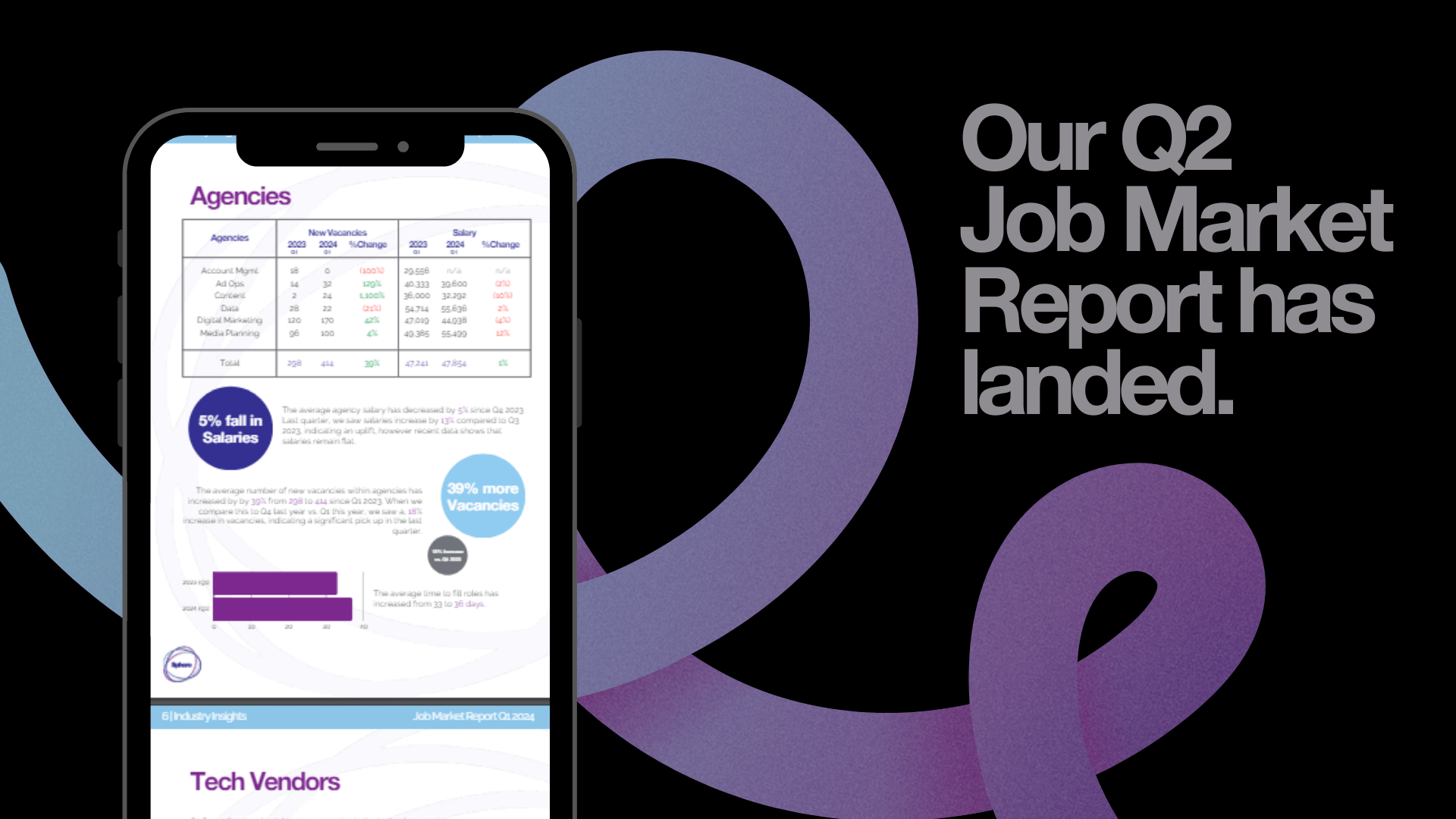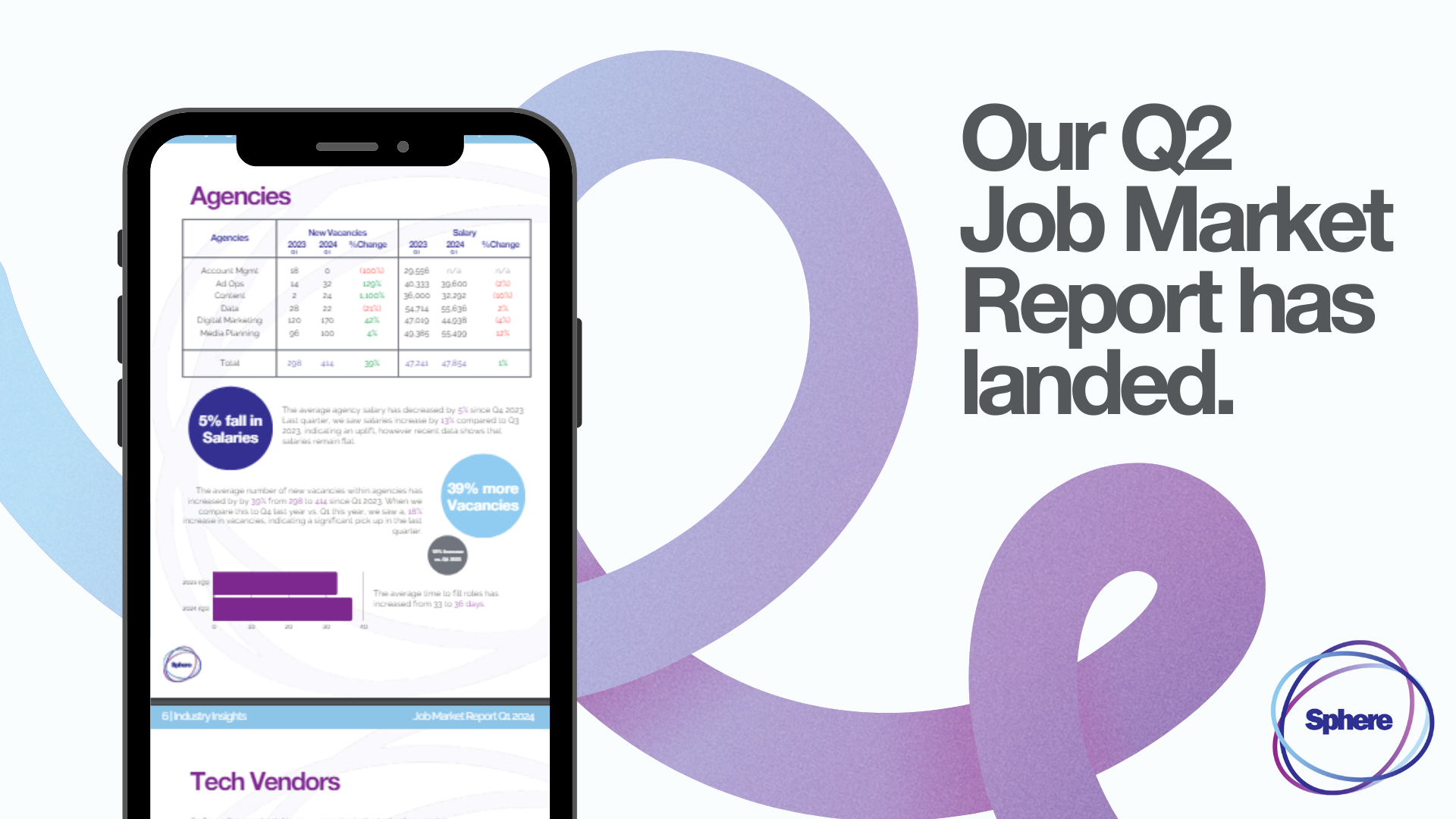
Initial Findings from our 2023 Salary and Benefits Survey
24 Feb, 20235 MinutesThe digital sector faced numerous challenges in 2022, recovering from global restrictions, e...

The digital sector faced numerous challenges in 2022, recovering from global restrictions, experiencing talent shortages, enjoying a surge in activity and hiring, and then economic downturns created a difficult landscape to navigate.
However, as we've seen time and time again, this industry is nothing if not resilient. Looking to the months ahead, we're excited about the opportunities and challenges that await us...
Key findings from our 2023 Salary and Benefits Report:
- 57% of respondents are considering a career move in 2023
- Salary remains the primary consideration for job seekers (71% of respondents), but a positive work environment, opportunities for career growth, and commitment to diversity, equity, and inclusion are equally crucial in retaining top employees
- 41% of businesses cite a recession/cost of living crisis as the biggest threat to their bottom line
- 46% of women surveyed received a pay rise last year, compared to 54% of male respondents, with a significant pay gap of £16,525 between men and women representing a 22% disparity in earnings
- Only 9% of respondents found their role through a direct application or contacts from a company's internal team, while 33% found their next role through a recruitment consultancy
- 1 in 2 businesses performed better than in previous years, with 35% remaining about the same and 15% experiencing worse outcomes
- 46% of female respondents reported receiving a pay raise last year, compared to 54% of males
- 33% of freelancers prefer to work as a limited company, 23% opting for an umbrella arrangement, 19% choosing PAYE, and 16% working as a sole trader
- 1 in 2 job seekers in the digital sector want remote working options, and flexible working, medical or dental healthcare, and remote working were the top three benefits across the sector
- There is a disparity in earnings between genders and also in bonuses, where 63% of men received a bonus last year versus 51% of women
Download the full report here
Hiring and Retention
In Europe, the UK, and North America, the job market across the digital sector is highly competitive, with a staggering 57% of respondents considering a career move in 2023. While salary is still the primary consideration for job seekers, it's not the only factor that influences their decision. According to the survey, a positive work environment, opportunities for career growth, and a commitment to diversity, equity, and inclusion are equally crucial for job seekers.
A poor work environment or company culture is the second most significant reason for someone leaving their role in the digital sector. This indicates that businesses need to prioritize creating a positive work environment and a company culture that supports employee growth and development.
When it comes to finding their next role, job seekers in the digital sector are most likely to use a recruitment consultancy or LinkedIn. This underscores the importance of having a strong brand presence and engaging with potential candidates on social media.
The survey also shows that flexible working, medical or dental healthcare, and remote working are the top three benefits that job seekers in the digital sector are looking for. Companies that want to attract and retain top talent need to offer these benefits and be flexible in how they structure work arrangements.

Contracts and Freelance Market
The contract and freelance market in the digital sector is constantly evolving, and this year's survey sheds light on the latest trends and challenges. Despite the opportunities for flexibility and diversity in projects, freelancers face a range of obstacles, from changes to regulations like IR35, to the potential for periods of non-work.
However, the data also shows that the market remains buoyant, with many professionals choosing to take advantage of the opportunities for innovation and advancements in technology. With 44% of contracts lasting over 6 months, it's clear that many freelancers are able to secure long-term arrangements, offering some stability in an otherwise uncertain landscape.
Despite the challenges, the freelance market in the digital sector continues to be a vital part of the industry. The data shows that 31% of contracts last between 3-6 months, and 17% last between 1-3 months. While many freelancers are able to secure long-term contracts, there is still a significant number who are only able to secure shorter-term arrangements. With this in mind, it's important for freelancers to remain adaptable and responsive to changing demands, while also seeking out support and guidance when needed.
Gender Pay Gap and Diversity
Despite progress in the digital sector, the gender pay gap remains a significant issue. Our survey found that the representation of men in the industry has increased, with 53% of respondents identifying as male. The pay gap between men and women remains substantial, with women earning £16,525 less than their male counterparts. This represents a 22% disparity in earnings and a 7% difference in freelance day rates.
The pay gap highlights the need for employers to address biases and ensure salary negotiations are equitable and inclusive. Biases and inequities start at the negotiation stage, where women and women from global majority backgrounds, in particular, face a specific type of backlash when they become assertive during salary negotiations. Employers need higher awareness levels or better processes to ensure that negotiations are fair.
Salary benchmarking and internal and external salary transparency are fundamental to closing pay gaps and promoting diversity. Employers should consider implementing these measures to ensure they are meeting legal requirements and best practices. By doing so, they can help promote a more diverse and equitable workplace, which will benefit everyone in the sector.
Download the full report to hear from the founder of Balance, the inclusive hiring consultancy, for her take on the data: Download the 2023 Salary and Benefits Survey

To get a more detailed view of salary data for specific roles, we encourage you to download the full report and see the complete salary tables for Customer Success & Professional Services, Ad Ops & Programmatic, Data & Analytics, Marketing, Media Planning & Buying, Product Management, and Technology, SaaS & Media Sales.
The report provides valuable information for job seekers, freelancers, employers, and anyone interested in the digital sector. By understanding the latest trends, challenges, and opportunities, you can make informed decisions and take steps to enhance your career or business. So, don't miss out on the chance to access this valuable information. Download the full report now and gain insights into the digital sector's future.



